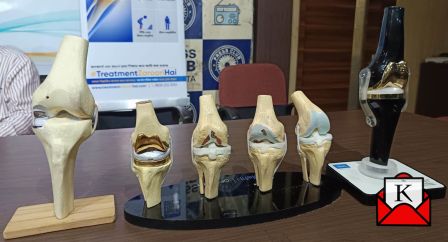Your Complete Guide To Partial Knee Replacement Surgery


Brigadier (Dr.) Barun Datta (Retd), a renowned orthopaedic surgeon with a long military medical career, held an informative press conference aimed at raising awareness of Noncompartmental Knee Replacement (UKR), another name for Partial Knee Replacement Surgery.
The purpose of the session was to inform patients and medical professionals about UKR’s advantages, developments, and factors. For patients with arthritis that only affects one compartment of the knee, UKR is a less invasive option than total knee replacement, Brigadier Dr. Datta added.
There are several benefits to partial knee replacement, such as faster recovery, the preservation of healthy knee tissue, and more natural knee movement after surgery. Giving patients the knowledge they need to make educated decisions about their treatment options is the aim.
As a Senior Orthopaedic Surgeon, he is affiliated with Narayana Hospital, RN Tagore Hospital, Mukundapur.
With UKR, only the injured knee is replaced, resulting in fewer incisions and less damage to the healthy tissues.
Compared to total knee replacement, patients frequently have shorter hospital stays and return to their regular activities more quickly.
UKR can lead to improved joint function and a more natural feeling by protecting the knee’s unaffected compartments.
Research has indicated that UKR can save money over time by reducing hospital stays and accelerating rehabilitation.
Brigadier Dr. Datta also addressed common questions about UKR’s longevity and success rates, pointing out that results are very favourable when patients are chosen carefully and surgical skills are applied.
Priyanka Dutta
